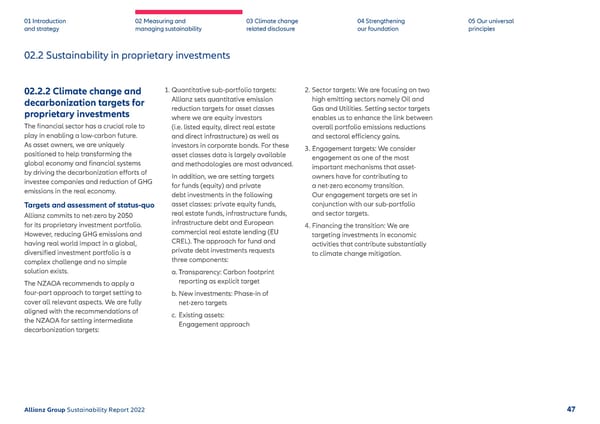01 Introduction and strategy 02 Measuring and managing sustainability 03 Climate change related disclosure 04 Strengthening our foundation 05 Our universal principles 02.2 Sustainability in proprietary investments 02.2.2 Climate change and decarbonization targets for proprietary investments The financial sector has a crucial role to play in enabling a low-carbon future. As asset owners, we are uniquely positioned to help transforming the global economy and financial systems by driving the decarbonization efforts of investee companies and reduction of GHG emissions in the real economy. Targets and assessment of status-quo Allianz commits to net-zero by 2050 for its proprietary investment portfolio. However, reducing GHG emissions and having real world impact in a global, diversified investment portfolio is a complex challenge and no simple solution exists. The NZAOA recommends to apply a four-part approach to target setting to cover all relevant aspects. We are fully aligned with the recommendations of the NZAOA for setting intermediate decarbonization targets: 1. Quantitative sub-portfolio targets: Allianz sets quantitative emission reduction targets for asset classes where we are equity investors (i.e. listed equity, direct real estate and direct infrastructure) as well as investors in corporate bonds. For these asset classes data is largely available and methodologies are most advanced. In addition, we are setting targets for funds (equity) and private debt investments in the following asset classes: private equity funds, real estate funds, infrastructure funds, infrastructure debt and European commercial real estate lending (EU CREL). The approach for fund and private debt investments requests three components: a. Transparency: Carbon footprint reporting as explicit target b. New investments: Phase-in of net-zero targets c. Existing assets: Engagement approach 2. Sector targets: We are focusing on two high emitting sectors namely Oil and Gas and Utilities. Setting sector targets enables us to enhance the link between overall portfolio emissions reductions and sectoral efficiency gains. 3. Engagement targets: We consider engagement as one of the most important mechanisms that asset- owners have for contributing to a net-zero economy transition. Our engagement targets are set in conjunction with our sub-portfolio and sector targets. 4. Financing the transition: We are targeting investments in economic activities that contribute substantially to climate change mitigation. Allianz Group Sustainability Report 2022 47
 Sustainability Report 2022 | Allianz Page 47 Page 49
Sustainability Report 2022 | Allianz Page 47 Page 49